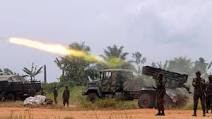DR Congo And Uganda Finally Launch Joint Military Operations Against Adf Rebels
Uganda and the Democratic Republic of Congo on Tuesday Nov. 30, finally launched military operations against rebels of the Allied Democratic Forces (ADF) who have been wreaking havoc in the eastern DR Congo.

Uganda and the Democratic Republic of Congo on Tuesday Nov. 30, finally launched military operations against rebels of the Allied Democratic Forces (ADF) who have been wreaking havoc in the eastern DR Congo.
The hostilities against the ADF rebels were opened with air and artillery bombardments from Ugandan territory and the entry into eastern DR Congo by Ugandan troops at the Nobili border post in North Kivu.
Both Kampala and Kinshasa confirmed the beginning of the military operations against the ADF.
Independent sources through amateur videos also gave credence to the information.
“The targeted and concerted actions with the Ugandan army have started today with air strikes and artillery bombardment from Uganda on positions of the ADF terrorists in DR Congo,” Patrick Muyaya, Congolese Minister of Communication and Media, announced in a post on social media.
“We have launched air and artillery strikes against ADF camps with our Congolese allies,” also declared, General Flavia Byekwaso, the spokesperson of the Ugandan army, adding that “the targets were achieved with precision and the terrorists will continue to be pursued during ground operations”.
General General Leon-Richard Kasonga, spokesperson of the DR Congo army, said the joint operations will carry out search and control operations to mop up and secure the ADF positions hit by the strikes Wednesday morning.
Patrick Muyaya, the Congolese Minister added that it was agreed that the operations be deeply carried out by the special forces of the two countries.
“At 05:00 hours, the chiefdom of Matalinga was woken up by the sound of heavy arms coming from a Ugandan border village,” said Zawadi Ngandanodette, president of a local civil society outfit, adding that this provoked panic among the population but the situation returned to normal afterwards.
According to other eyewitness accounts, explosions were also heard in the neighbouring Ituri province around Boga and Tchabi, sectors known to harbor several ADF rebels.
In the afternoon, a humanitarian worker at the border in Nobili “saw a column of Ugandan soldiers on foot, and heavily armed with armoured vehicles following them behind entering Congolese territory.”
A United Nations source revealed that the Ugandan soldiers were moving towards Kamango, a locality situated eight kilometres to the northwest.
An adviser in the DR Congo presidency had Sunday, Nov. 28, confirmed on condition of anonymity, information from diplomatic sources to the effect that President Felix Tshisekedi had authorized the Ugandan army to cross the border into Congo to attack the ADF.
The source had added that it was necessary for all the procedures to be respected notably at the level of parliament through a vote by the representatives of the people.
This authorization was not and is still not welcome by all Congolese, some of whom were quick to point out the roles played by Uganda and Rwanda in the destabilization of the eastern DR Congo for the past thirty years.
The Congolese Minister of Communication and Media, Patrick Muyaya had on Monday, Nov. 29, indicated that there were no Ugandan troops in DR Congo but added that “concerted and targeted actions” were “envisaged with the Ugandan army to combat the ADF terrorists who are our common enemy.”
The ADF was a coalition of Ugandan armed groups most of which were composed of Muslims opposed to the regime of President Yoweri Museveni.
They have since 1995 been installed in eastern DR Congo from where they carry out atrocities and are considered the most murderous of the armed groups operating in the region.
Since April 2019, some of their attacks have been claimed by the Islamic State which has been designating the group as its Central African Province.
In March this year, the United States of America placed the ADF among terrorist groups affiliated to the jihadists of the Islamic State.
Uganda has been accusing a local group linked to the ADF as being the authors of the double suicide attack on its capital Kampala on Nov. 16, 2021 which left four persons dead.
This attack followed a bomb attack on a restaurant in Kampala on Oct. 23, 2021 and another suicide bomb attack on a bus in Kampala two days later.
North Kivu and the neighbouring province of Ituri have since May 6, 2021 been under a state of siege declared by DR Congo president Felix Tshisekedi and civilian authorities have since been replaced by military and police administrators.
However, in spite of this, the DR Congo army, according to the Kivu Security Barometer (KSB), has not been able to stem the massacre of about 1,200 civilians since the state of siege was declared.
Support Our Journalism
There are millions of ordinary people affected by conflict in Africa whose stories are missing in the mainstream media. HumAngle is determined to tell those challenging and under-reported stories, hoping that the people impacted by these conflicts will find the safety and security they deserve.
To ensure that we continue to provide public service coverage, we have a small favour to ask you. We want you to be part of our journalistic endeavour by contributing a token to us.
Your donation will further promote a robust, free, and independent media.
Donate HereStay Closer To The Stories That Matter




